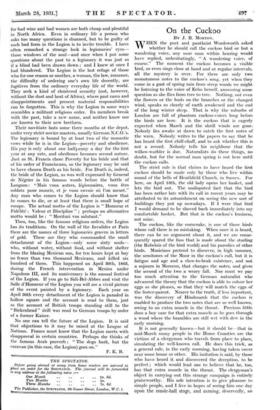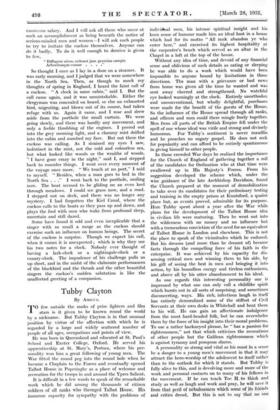On the Cuckoo
By J. B. MORTON.
TAT HEN the poet and pantheist Wordsworth asked V V whether he should call the cuckoo bird or but a wandering voice, any sane man within hearing would have replied, unhesitatingly, "A wandering voice, of course." The moment .the cuckoo becomes a visible bird, or even sings close at hand and at regular intervals, all the mystery is over. For there are only two monotonous notes to the cuckoo's song, yet when they ' come in a gust of spring rain from steep woods we might be listening to the voice of Echo herself, answering some question as she flies from tree to tree. Nothing, not even the flowers or the buds on the branches or the changed wind, speaks so clearly of earth awakened and the end of the long winter sleep. That is why the suburbs of London are full of phantom cuckoo-voices long before the birds are here. It is the cuckoo that is eagerly expected when March and the shrill winds are gone. Nobody lies awake at dawn to catch the first notes of the wren. Nobody. writes to the papers to say that he has heard the first chiff-chaff, and to ask whether this is not a record. Nobody tells his neighbour that the willow-warbler is due. Naturalists do these things, no doubt, but for the normal man spring is not here until the cuckoo calls.
The strict rule is that claims to have heard the first cuckoo should be made only by those who live within sound of the bells of Heathfield Church, iu Sussex. For here, on April 13th, the old lady opens her basket, and lets the bird out. The undisputed fact that the bird has been rather late with its call in recent years may be attributed to its astonishment on seeing the new sort of buildings they put up nowadays. If I were that bird I would demand to be shoved back immediately into my comfortable basket. But that is the cuckoo's business, not mine.
The cuckoo, like the corncrake, is one of those birds whose call there is no mistaking. When once it is heard, there can be no argument about it, and we are conse- quently, spared the fuss that is made about the starling (the Rabelais of the bird world) and his parodies of other birds. Musicians pretend to discover, in high summer, the semitones of the Moor in the cuckoo's .call, but it is fatigue and age and a claw-to-beak existence, and not a sojourn in Morocco, that changes the notes, and gives the second of the two a weary, fall. Nor must we pay too much attention to the German naturalist who advanced the theory that the cuckoo is able to colour her eggs as she pleases, so that they will match the eggs of the foster-parent. Nearer to the truth, if less important, was the discovery of Hindmarsh that the cuckoo is enabled to produce the two notes that are so well known, owing to an extra muscle in the throat. Precious little does a boy care for that extra muscle as he goes through a wood where the brambles are still wet with dew in the early morning.
It is not generally known—but it should be—that in mid-March many people in the Home Counties are tilt victims of a clergyman who travels from place to place, simulating the well-known call. He does this trick, as a general rule, in the early morning, having taken cover near some house or other. His imitation is said, by those who have heard it and discovered the deception, to be perfect ; which would lead one to believe that he, too, has. that extra muscle in the throat. The clergyman's object in carrying out this strange campaign is entirely praiseworthy. His sole intention is to give pleasure to simple people, and I live in hopes of seeing him one day upon the music-hall stage, and earning, deservedly, an enormous salary. And I will ask all those who sneer at such an accomplishment as being beneath the notice of serious-minded men and women—I will ask such people to try to imitate the cuckoo themselves. Anyone can do it badly. To do it well enough to deceive is given to few.
" Diffugere nives, redeunt jam gramina campis Arboribusque comae . . . ."
So thought I once as I lay in a doze on a steamer. It was early morning, and I judged that we were somewhere in the North Sea. Then, as though to mock my thoughts of spring in England, I heard the faint call of a cuckoo. "A clock in some cabin," said I. But the call came again, and it was unmistakable. Either the clergyman was concealed on board, or else an exhausted bird, migrating, and blown out of its course, had taken refuge with us. Again it came, and I rose and drew aside from the porthole the small curtain. We were going slowly, and there was hardly any movement, and only a feeble throbbing of the engines. I peered out into the grey morning light, and a clammy mist drifted into the cabin and numbed my face. But out there the cuckoo was calling. As I strained my eyes I saw, indistinct in the mist, not the cold and colourless sea, but what looked like woods or the wraiths of woods. "I have gone crazy in the night," said I, and stepped back to consider things. I went over every moment of the voyage once more. "We touch at no port," I said to myself. "Besides, when a man goes to bed in the North Sea . . ." I went back to the porthole, smiling now. The boat seemed to be gliding on an even keel through meadows. I could see grass now, and a road. I stepped out on deck, and there was no longer any mystery. I had forgotten the Kiel Canal, where the cuckoo calls to the boats as they pass up and down, and plays the fool with men who wake from profound sleep, uncertain and still dazed.
Some have found it odd and even inexplicable that a singer with so small a range as the cuckoo should exercise such an influence on human beings. The secret of the cuckoo is surprise. Though we expect his call, when it comes it is unexpected ; which is why they use his two notes for a clock. Nobody ever thought of having a lark-clock or a nightingale-clock or a canary-clock. The impudence of his challenge pulls us up short, and in the midst of the elaborate performances of the blackbird and the thrush and the other beautiful singers the cuckoo's sudden salutation is like the unaffected greeting of a companion.















































 Previous page
Previous page